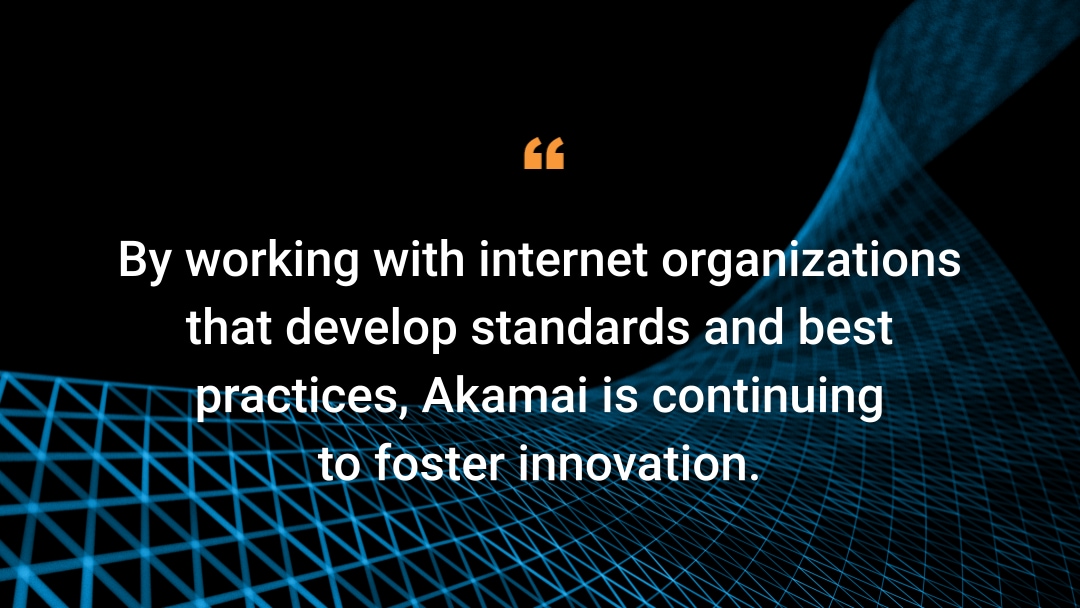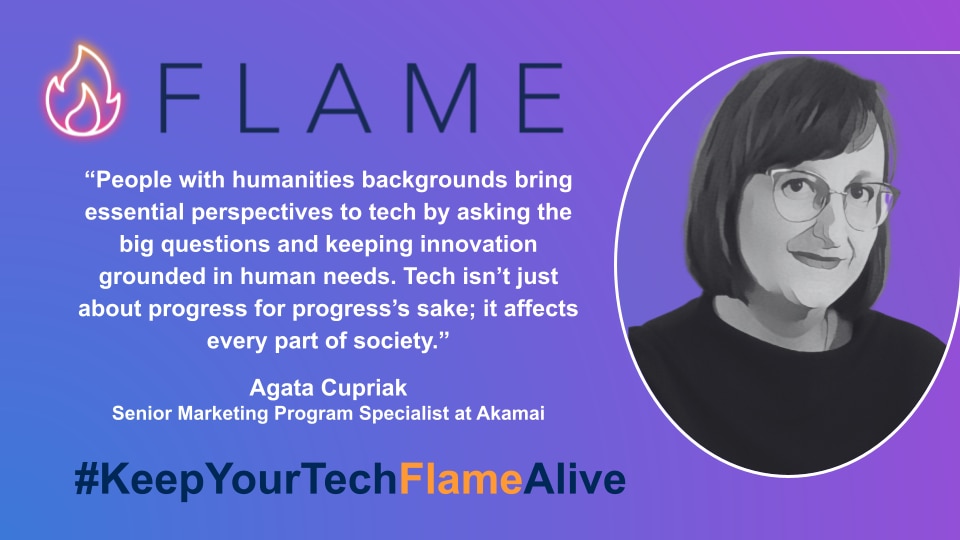How Akamai Works with Internet Organizations

Akamai was created to provide services over the internet, so interoperability — the ability of computer systems or software to exchange information — is paramount. This includes communication among not only the websites of our customers, but also the browsers used by their customers, the end users.
Interoperability also means that we have to work with a great deal of internet infrastructure, such as the Domain Name Service (DNS) that maps names like www.akamai.com to IP addresses (such as 2600:1401:4000:5b1::b63 or 23.36.37.109), and Border Gateway Protocol routers that move packets across the internet from one ISP to another, all the way down to the user's home router.
Working together to foster innovation
One way to keep on top of all this is to work with internet standards development organizations — including the Internet Engineering Task Force and the World Wide Web Consortium — that are focused on administration and operations. By working with internet organizations that develop standards and best practices, Akamai is continuing to foster innovation.
Here is an introduction to and brief overview of the organizations that we’re involved with in these areas.
Internet standards development organizations
The Internet Engineering Task Force
The Internet Engineering Task Force (IETF) is a self-selected group of (mostly) engineers who define the protocols that make the internet work better, including things like TLS (previously written as SSL/TLS), TCP/IP, and DNS. These protocols are created by IETF Working Groups. There are usually more than 100 active Working Groups at any given time, each with a specific focus.
There are no membership fees to join the IETF; individuals can simply join in the discussions on the Working Group mailing list and help to write or edit drafts that get published as IETF Requests for Comments, the "formal standards" of the internet.
Akamai’s participation in Working Group discussions
Akamai generally has more than a dozen people engaged in the Working Group discussions, either virtually or in person. (For the past two years, the discussions have all been online, but the IETF is starting to move to a hybrid situation in which the work happens both online and in person.)
Akamai employees are heavily involved in the Working Groups related to security, QUIC protocol, HTTP/3, DNS, and others. We have chaired TCP maintenance and extensions groups and the ACME ("LetsEncrypt") protocol group. And an Akamai employee was the security area director for four years.
The World Wide Web Consortium
The World Wide Web Consortium (W3C) is also a very important international internet standards community. This group is structured more like a classic standards development organization, with membership fees and annual meetings. Each member organization has a contact person who approves others in their group to work on particular projects.
Member performance is important to this organization, so it should not be a surprise that Akamai employees co-chair the Web Performance Working Group, the Multicast Community Group, and the WebTransport Working Group.
The specialists
While the IETF and W3C can be thought of as "generalist organizations" that strive to make the internet work better overall, there are other standards bodies that are focused on very specific tasks of the internet — and they can be thought of as "specialists." Because Akamai delivers so much video content for our customers, we are also active in three specialist groups.
The Consumer Technology Association
The Consumer Technology Association’s Web Application Video Ecosystem (WAVE) Project is a group of 60 companies that collaborate to create standards that improve how internet-delivered commercial video is handled on consumer electronics devices and to make it easier for content creators to distribute video to those devices. Akamai founded and chaired this project, and has been active in the creation of multiple standards for the Common Media Client Data, Common Access Token, DASH-HLS Interoperability, and the Joint Content Conformance Test Suite groups.
DASH Industry Forum
Over the past decade, the DASH Industry Forum has published guidelines and standards related to the commercial use of the MPEG-DASH streaming standard. Akamai was also a founding member and has chaired the organization, and remains active in creating specifications regarding low-latency live video, A|B watermarking, Enhanced Clear Key Content Protection, and Content Steering.
Coalition for Content Provenance and Authority
The Coalition for Content Provenance and Authenticity (C2PA) addresses the prevalence of misleading online information through the development of technical standards for certifying the source and history (or provenance) of media content. Akamai participates in C2PA as an associate member.
Other organizations
The final group of organizations perform a mixture of administrative functions, and are also focused on operations and best practices.
Internet Corporation for Assigned Names and Numbers
The Internet Corporation for Assigned Names and Numbers (ICANN) is responsible for the root of the DNS system: the collection of 13 servers around the world that can be a starting point to find out the address of any machine on the public internet. ICANN also handles top-level domain names, policies for DNS registration, and so forth. Akamai employees are on the board of one ICANN advisory committee, and have previously chaired the root zone advisory committee.
ICANN facilitates the interaction between the Internet Assigned Numbers Authority and the Regional Internet Registries (discussed below) to hand out and coordinate unique number resources globally. As of September 2022, an Akamai employee will be a member of the overall ICANN board.
Certification Authority Browser Forum
The Certification Authority Browser Forum (CA/Browser Forum) is a collection of browser and CA vendors, who write recommendations for how certificates and public-key infrastructure should be managed on the World Wide Web. Akamai is not a member of this organization, but we do track the CA/Browser Forum activities pretty closely.
Regional Internet Registries
There are five Regional Internet Registries (RIRs) around the world, organized by global geography:
African Network Information Center (AFRNIC)
Asia-Pacific Network Information Centre (APNIC)
American Registry for Internet Numbers (ARIN)
Latin America and Caribbean Network Information Centre (LACNIC)
Réseaux IP Européens Network Coordination Centre (RIPE NCC)
Akamai is a member of ARIN, and Akamai employees are on the boards of APNIC and RIPE NCC. The RIRs are responsible for handing out number resources, such as IPv4, IPv6, and autonomous system numbers. They also commonly provide platforms for training, network coordination, and operator forums for best common practices. Akamai works with the RIR forums and conferences extensively to coordinate peering and capacity-building with other operators, but also to introduce and evangelize our Akamai Accelerated Network Partner Program.
Internet Society
The Internet Society (ISOC) is a nonprofit organization that supports training and development around the internet. It is also the operator of the Public Interest Registry and is the corporate home of the IETF. ISOC also supports peering conferences in Africa and the Mutually Agreed Norms for Routing Security (MANRS) initiative. Akamai is a participant and cofounder of the MANRS CDN and Cloud Providers Program to ensure global routing security.
Internet exchanges
Internet exchanges (IXs) are both a physical and a social platform to facilitate interconnection among network operators. Akamai uses IXs extensively to deliver traffic with a low latency to our end users. Akamai’s networks are currently connected to approximately 200 IXs around the world. We have also been the founder of several IXs, and have sat on the board of many major IXs over the past decade.
Continuing the information exchange
If you'd like to find out more about our involvement in internet standards development organizations, please reach out via our website or contact your Akamai customer representatives directly. If you see someone from Akamai at a standards meeting, feel free to say hello!
This article was written by Rich Salz, with contributions from Christian Kaufmann, Will Law, and Melissa Chavez Torres.





